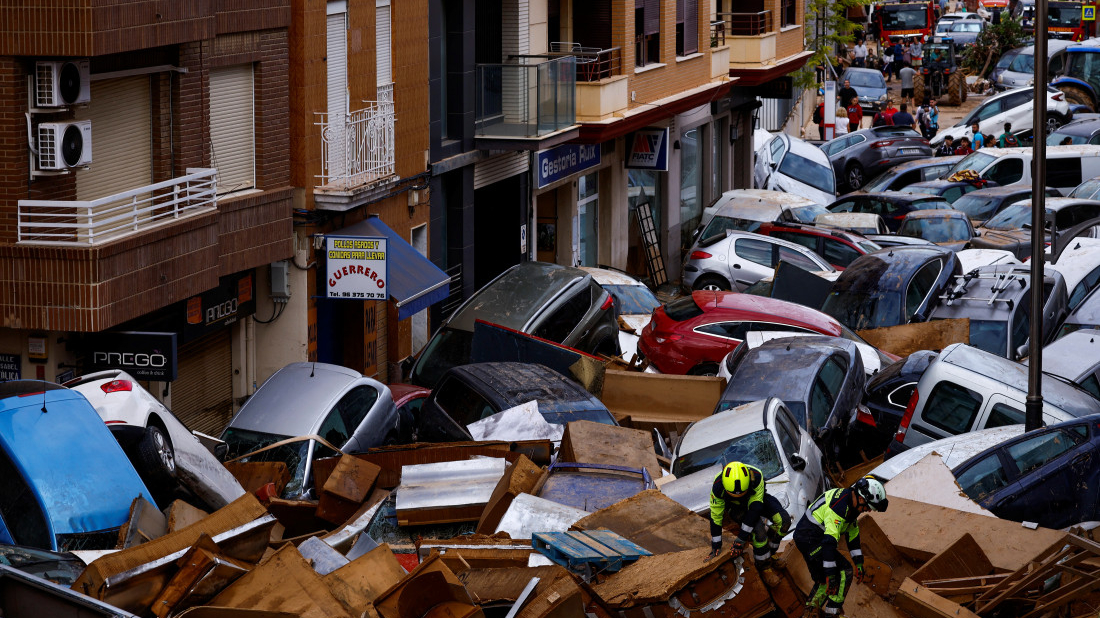Munich Security Conference panel sees Middle Corridor as peace catalyst
Senior officials from Azerbaijan, the European Union and China used the stage at the Munich Security Conference to promote the Trans-Caspian Internati...

In response to devastating floods that have claimed over 150 lives in Spain, the UN is emphasizing the need for immediate global action to reduce greenhouse gas emissions
In response to devastating floods that have claimed over 150 lives in Spain, the United Nations is emphasizing the need for immediate global action to reduce greenhouse gas emissions and bolster early warning systems worldwide.
The extreme weather in Spain follows a troubling global pattern of increasingly frequent and intense weather events, a trend linked to climate change, according to Clare Nullis, spokesperson for the UN’s World Meteorological Organization (WMO). “The flooding we’re seeing in Spain is just one of many extreme weather and water-related disasters around the world this year. Almost every week, we’re seeing shocking images of devastation,” she told journalists in Geneva.
In Spain, the Valencia region has been hardest hit, with some areas receiving an entire year’s worth of rainfall within just eight hours. The Spanish meteorological agency, AEMET, has been issuing continuous alerts via the common alerting protocol - a global standard for hazard warnings across all media. On Friday, the southwest province of Huelva was placed on red alert, the highest warning level.
The Spanish floods are part of a larger pattern, Nullis noted, recalling that parts of Central Europe also experienced unprecedented rainfall in mid-September. According to the Intergovernmental Panel on Climate Change (IPCC), climate change has made extreme weather events more likely and more severe.
The WMO’s recent report on global water resources highlights a warming atmosphere's role in accelerating the hydrological cycle. Rising temperatures lead to more atmospheric moisture, resulting in heavier rainfall and, consequently, flooding. “As the air warms, it becomes more moist,” Nullis explained. “Every additional fraction of warming increases atmospheric moisture content, which heightens the risk of extreme precipitation and flooding.”
Nullis stressed that immediate steps are essential to mitigate climate change impacts and prevent similar disasters worldwide. “A good start would be reducing greenhouse gas emissions,” she urged, adding that early warning systems must prompt “informed early action.”
The WMO will release its latest State of the Global Climate update at the COP29 climate conference in Azerbaijan later this month, providing more insights into the year’s extreme weather events and their connection to climate change.
Europe heads into the Munich Security Conference, on Friday (13 February), amid deepening unease over U.S. policy, as President Donald Trump’s hard-line stance on defence, trade and territory fuels doubts about Washington’s long-term commitment to transatlantic security.
American figure skating star Ilia Malinin endured a dramatic collapse in the men’s free skate on Friday night, falling twice and tumbling out of medal contention at the Milan Cortina Winter Olympics as Kazakhstan’s Mikhail Shaidorov surged to a surprise gold medal.
“Respected and feared globally,” U.S. President Donald Trump told troops at Fort Bragg on Friday (13 February), framing America’s renewed strength against to mounting pressure on Iran amid stalled nuclear talks.
Dubai-based global ports operator DP World said on Friday that its long-serving chairman and chief executive, Sultan Ahmed Bin Sulayem, has stepped down following mounting pressure linked to alleged ties to disgraced financier Jeffrey Epstein.
Speaking at Munich Security Conference, Ukrainian foreign minister Andrii Sybiha calls for decisive steps ahead of expected Geneva talks
The administration of U.S. President Donald Trump on Thursday (12 February) announced the repeal of a scientific finding that greenhouse gas emissions endanger human health, and eliminated federal tailpipe emissions standards for cars and trucks.
Tropical Cyclone Gezani has killed at least 31 people and left four others missing after tearing through eastern Madagascar, the government said on Wednesday, with the island nation’s second-largest city bearing the brunt of the destruction.
Rivers and reservoirs across Spain and Portugal were on the verge of overflowing on Wednesday as a new weather front pounded the Iberian peninsula, compounding damage from last week's Storm Kristin.
Morocco has evacuated more than 100,000 people from four provinces after heavy rainfall triggered flash floods across several northern regions, the Interior Ministry said on Wednesday.
Greenland registered its warmest January on record, sharpening concerns over how fast-rising Arctic temperatures are reshaping core parts of the island’s economy.
You can download the AnewZ application from Play Store and the App Store.

What is your opinion on this topic?
Leave the first comment